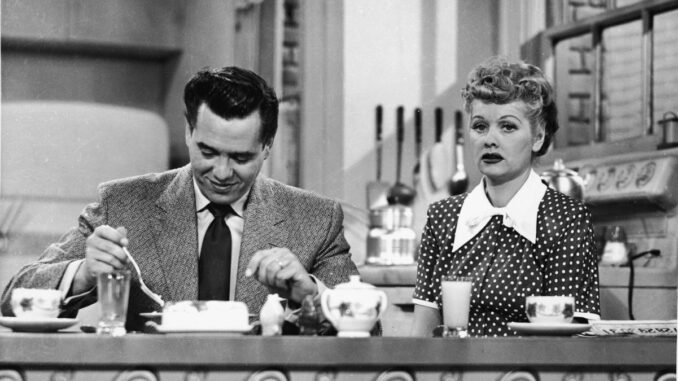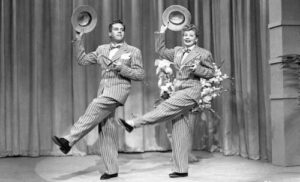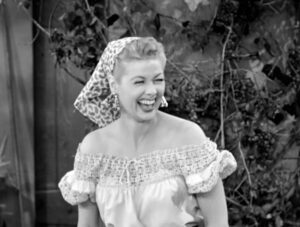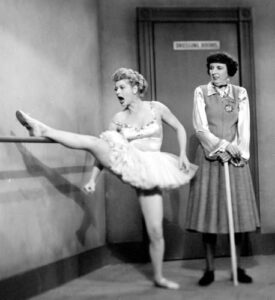
Introduction: Why ‘I Love Lucy’ Still Captivates Audiences
When you think of classic television, one name always rises to the top: I Love Lucy. But have you ever wondered what went on behind the scenes? The making of this iconic show wasn’t just revolutionary for its time; it laid the groundwork for modern television as we know it today. Let’s dive into the fascinating behind-the-scenes world of I Love Lucy and discover how it made TV history.
The Birth of a Television Classic
Lucille Ball and Desi Arnaz: A Power Couple On and Off Screen
Lucille Ball and Desi Arnaz didn’t just star in I Love Lucy; they transformed how television was produced. Their chemistry, both on and off the screen, drove the show’s success and set a new standard for sitcoms.
The Innovative Desilu Productions
Did you know Desilu Productions pioneered the multi-camera format still used in sitcoms today? This innovative approach gave I Love Lucy its distinctive look and allowed for live audience reactions that brought the comedy to life.

Breaking New Ground: The Multi-Camera Technique
Why the Multi-Camera Setup Was Revolutionary
Before I Love Lucy, most TV shows were filmed using a single camera. The multi-camera setup, developed by cinematographer Karl Freund, changed everything. It allowed for multiple angles to be captured simultaneously, speeding up production and enhancing the viewer experience.
Filming in Front of a Live Audience
What made I Love Lucy stand out even more was its live audience. Their laughter added an authentic energy, making viewers at home feel like they were part of the action.
Comedy Timing: The Secret Sauce
Lucille Ball’s Impeccable Timing
Lucille Ball’s comedic genius wasn’t just in her delivery—it was in her timing. Every physical gag, every facial expression, was perfectly calculated to maximize laughter.
Desi Arnaz’s Role in Shaping Comedy
While Ball was the face of the show, Arnaz was its heartbeat. His background in music helped him master the rhythm of comedy, ensuring every punchline hit the mark.
The Influence of Real-Life on Storylines
Drawing From Their Own Lives
Many of the show’s plotlines were inspired by Lucille and Desi’s real-life experiences. This authenticity resonated with audiences, making the humor even more relatable.
Balancing Family and Fame
The couple’s dynamic as working parents broke new ground, showcasing a relatable yet aspirational depiction of married life on TV.

Technical Challenges and Triumphs
Lighting the Set: A Cinematic Approach
The show’s cinematographer, Karl Freund, brought his experience from Hollywood films to the small screen. His lighting techniques gave I Love Lucy a polished, cinematic feel.
Editing for Perfection
Post-production was just as crucial. Tight editing ensured that every scene flowed seamlessly, maintaining the comedic timing that the show became famous for.
The Business Side of ‘I Love Lucy’
Syndication: The Goldmine
I Love Lucy was one of the first shows to benefit from syndication, which kept it on air long after its original run. This business model has since become a staple in the industry.
Ownership of Their Content
Lucille Ball and Desi Arnaz made a groundbreaking decision to own the rights to their show. This move not only gave them control over their legacy but also made Desilu Productions a powerhouse in television.

Impact on Pop Culture
Creating Iconic Moments
Who can forget the classic scenes like Lucy and Ethel at the chocolate factory or Lucy stomping grapes? These moments have become ingrained in pop culture and are still referenced today.
Influence on Future Sitcoms
The success of I Love Lucy paved the way for countless sitcoms. Shows like Friends and The Big Bang Theory owe a debt to the trail blazed by Lucy and Desi.
Why the Show Endures
Timeless Humor
Even decades later, the humor in I Love Lucy feels fresh. Its blend of physical comedy and clever dialogue appeals to audiences of all ages.
Relatable Characters
At its core, I Love Lucy is about relationships. The ups and downs of Lucy and Ricky’s marriage, along with their friendships with the Mertzes, make the show universally relatable.
Behind-the-Scenes Tensions
Balancing Work and Personal Life
While their on-screen chemistry was undeniable, the pressures of producing I Love Lucy took a toll on Lucille and Desi’s marriage.
Navigating Fame
The show’s immense success brought its own set of challenges, from grueling schedules to constant public scrutiny.
The Legacy of ‘I Love Lucy’
Awards and Accolades
The show won numerous awards during its run, including five Emmys. Its groundbreaking achievements continue to be celebrated today.
Influence on Modern TV
From pioneering production techniques to setting the standard for sitcom storytelling, I Love Lucy remains a blueprint for success in television.
Conclusion: A Show That Defined an Era
I Love Lucy wasn’t just a sitcom; it was a revolution. By breaking new ground in production, storytelling, and comedy, it set the stage for the golden age of television. Even today, its influence is felt in every corner of the entertainment industry.
FAQs
1. What made ‘I Love Lucy’ so innovative?
The show’s use of the multi-camera setup and filming in front of a live audience were groundbreaking techniques that transformed television production.
2. How did Lucille Ball and Desi Arnaz influence TV history?
They not only starred in the show but also pioneered new production methods and business practices that are still used in the industry.
3. Why is ‘I Love Lucy’ still popular today?
Its timeless humor, relatable characters, and iconic moments continue to resonate with audiences of all generations.
4. What were some challenges faced during the production of ‘I Love Lucy’?
The show faced technical challenges like perfecting lighting and editing, as well as personal challenges, such as balancing the stars’ marriage with their demanding work schedules.
5. How did Desilu Productions change the TV landscape?
Desilu Productions introduced innovative techniques and owned its content, setting a precedent for future television production companies.